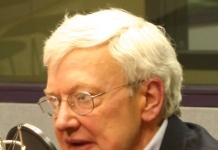 For the past several years, film critic Roger Ebert has been unable to talk, due to complications from cancer surgery that left him without a lower jaw.
For the past several years, film critic Roger Ebert has been unable to talk, due to complications from cancer surgery that left him without a lower jaw.
But thanks to CereProc, a company that mines words and syllables from existing audio sources (such as the many commentary tracks and TV shows Ebert has recorded) and sets them up in a text-to-speech application, Ebert is now able to “speak” with a voice that is noticeably his. It will never be mistaken for his “real” voice from days of old, but it sounds a lot better than the stock speech synthesizer he had been using.
Perhaps someday something like this can make its way into readers like the Kindle: instead of an artificial computer voice, you could have your favorite actor or TV personality read an e-book to you. But for now, I’m thrilled that it is helping Ebert, whom I have long respected, to communicate again.

































it must have been so frustrating to not have been able to speak 🙁
I watched and listened to this when he was on Oprah. Very VERY cool, very exciting for the future of TTS and what it can mean to people.
I admire him! I can’t imagine what it took, not being able to speak!
That’s good news. I’m happy for Roger Ebert.
On TTS in general, I’m pleased with how it’s progressing. The better engines almost — almost! — don’t sound robotic. Try this one, which will read the last paragraph from Chris’ article: http://tts.imtranslator.net/9lHJ
I could listen to a book read like that. It’s a step above the Kindle’s engine.